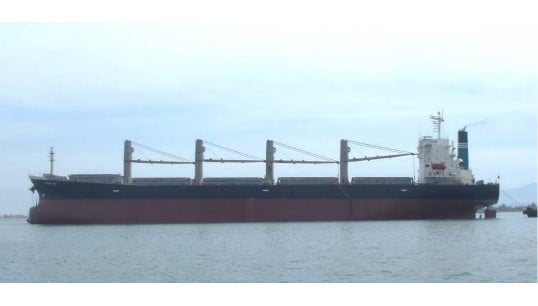- Topics
- Campaigning
- Careers
- Colleges
- Community
- Education and training
- Environment
- Equality
- Federation
- General secretary message
- Government
- Health and safety
- History
- Industrial
- International
- Law
- Members at work
- Nautilus news
- Nautilus partnerships
- Netherlands
- Open days
- Opinion
- Organising
- Podcasts from Nautilus
- Sponsored content
- Switzerland
- Technology
- Ukraine
- United Kingdom
- Welfare

Extreme heat caused the death of a seafarer during an incident in Qatar last year. As heat waves become more common, seafarers should arm themselves with information on how to treat those seriously affected by high temperatures, writes Andrew Linington
A new report has warned that climate change is posing a growing health and safety risk to seafarers working in extreme heat.
The alert follows an investigation into an incident in which one seafarer died, two collapsed and one other suffered the effects of heat exhaustion while working in temperatures between 40°C and 45°C in the port of Mesaieed, Qatar, last year.
Malta’s Marine Safety Investigation Unit says the increased frequency, duration and intensity of heat waves linked to climate change means there is likely to be an growing number of similar cases in which crew members suffer from heat exhaustion and heat stroke.
It also warns that many seafarers do not get the necessary time to properly acclimatise to extreme temperatures and humidity during a voyage.
The report notes that International Maritime Organization elementary first aid and medical care model courses do not cover training to help victims of heat stroke. It recommends that Malta seeks new IMO requirements for ‘emphasised seafarer training on the on-site treatment of heat stroke/hyperthermia casualties on board, taking into consideration the predicted effects of climate change’.
The accident occurred during mooring operations as the 52,579dwt bulk carrier Elpida GR entered the port on 27 July 2023. The bosun and two ratings collapsed as lines were being passed ashore and the chief officer then complained of feeling unwell. All four were taken to a hospital ashore, but the bosun was confirmed to be dead, as a result of heat stroke, and the others were suffering from heat exhaustion.
Investigators found that some crew members had worked up to 89 hours in the five days preceding the accident, cleaning the cargo holds after discharging rice in the Iraqi port of Umm Qasr ahead of loading a bulk cargo of urea in Qatar.
The report concludes that the effects of extreme heat may have been exacerbated by fatigue and sleep deprivation. The crew members had already experienced a month of high temperatures and humidity during cargo operations in Iraq, as well as poor quality sleep caused by the ‘uncomfortable warm conditions’ in the accommodation areas.
Although the ship’s owners denied that any bonus had been promised for the cargo hold cleaning work, the report notes that some crew members believed they would get one and investigators said they could not exclude the possibility that such payments would have served as an incentive for the seafarers to work such long hours.
The report notes that crew members took most of the recommended action to treat the bosun after he collapsed, including moving him to shade, stripping off clothing, and fanning him.
However, it adds, they were unaware of The International Medical Guide for Ships advice to cool his body with water and apply cold packs or immerse him in a bath of cold water.
Following the accident, the ship’s Greek owners revised their safety management system manual to include a section on ‘working in hot environments’, together with a related checklist and precautionary measures to be taken.
Tags
